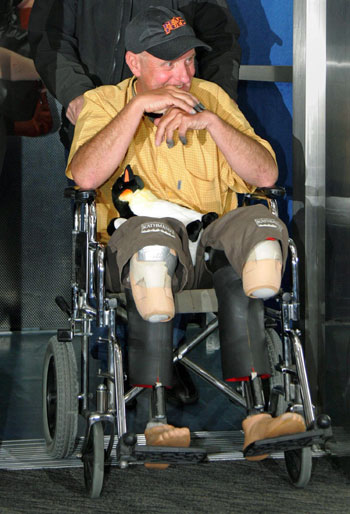New Zealand climber Mark Inglis has defended himself against criticism from
the world's most famous mountaineer, saying there was little his team could do
to save a dying climber on Mt Everest.

New Zealander Mark
Inglis, the first double amputee to scale Mt Everest, arrives at
Christchurch airport, New Zealand May 25, 2006. Edmund Hillary, the first
man to climb Mount Everest, has blamed the commercialization of climbing
the world's highest mountain for the death of a British climber, a
newspaper reported on Wednesday. [Reuters] |
Inglis became the first double amputee to conquer the world's highest
mountain last week but on the way to the 8848-metre summit, the team found
British climber David Sharp, 34, near death in a cave 300 metres below the
summit, a place known as the "Death Zone."
They tried to help but Inglis said they could do little for him and they
carried on to the summit.
Their decision not to abandon the summit bid and try to save Sharp drew
strong criticism from Sir Edmund Hillary, who said they should have abandoned
their climb and tried to save him.
Sir Edmund with Sherpa Tenzing Norgay were the first men to reach the summit
of Everest as part of a British expedition in May, 1953.
"It was wrong if there was a man suffering altitude problems and was huddled
under a rock, just to lift your hat, say `good morning' and pass on by," Sir
Edmund said today.
Sir Edmund said the 1953 British team would have abandoned their summit bid
if another climber's life had been in danger on the mountain.
Everest has claimed at least 150 lives.
"I think it was the responsibility of every human being. Human life is far
more important than just getting to the top of a mountain.
"My expedition would never for a moment have left one of the members or a
group of members just lie there and die while they plugged on towards the
summit."
However, Inglis said nothing could be done to save Sharp. Have your say
What do you think of climbers on Mount Everest leaving David Sharp to die?
Inglis said when they found Sharp he was barely alive. He was virtually
frozen solid, could not speak and the only signs of life they could detect was
movement in his eyes.
Mr Inglis is a former professional search and rescue mountaineer and like the
rest of his party, it grieved him to leave Mr Sharp.
"But most importantly I was only one member of a team. I had very little to
do with David apart from recognising the fact that he was in there.
"Other members of our team spent time with David. Various experienced sherpas
of ours spent time with David, all to no avail."
Mr Inglis said the criticism had focused on him.